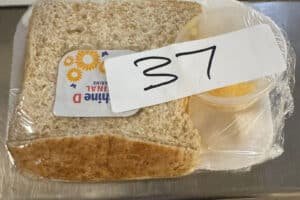One of the children undergoing surgery was nine-month-old Victor from Caleb Motshabi informal settlement in Bloemfontein.

In a life-changing project, the Charlotte Maxeke Academic Hospital yesterday launched Smile Week by embarking on reconstructive surgery on 14 children from disadvantaged families suffering from facial anomalies, thanks to the Smile Foundation and the Gauteng department of health.
According to the foundation, South Africa’s current lowest Covid level of restrictions has brought immense relief for parents waiting for their children’s time-sensitive surgeries – like cleft lip and palate repair – which were put on hold due to the pandemic.
The organisation said July is National Cleft and Craniofacial Awareness and Prevention Month and it brings with it a much-needed alleviation of the backlog of corrective surgeries, which will be made possible during Smile Week.
Smile Week is fitting as the country is also celebrating Madiba Month, with former president Nelson Mandela having been passionate in addressing the trauma of children’s disfigurement.
One of the children undergoing surgery was nine-month-old Victor from Caleb Motshabi informal settlement in Bloemfontein. He was born with Apert’s Syndrome, a rare genetic disorder affecting the skull, face, hands and feet.
The condition presents premature closure of the skull (craniosynostosis), which causes a cosmetic deformity of an abnormal head shape – making children extremely self-conscious and causing pressure on the developing brain.
ALSO READ: 780 operations cancelled at Charlotte Maxeke Hospital
The disease leaves little room for it to grow, which can lead to the disruption of children’s intellectual development and chronic headaches. Victor’s life-changing surgery will be performed by Charlotte Maxeke’s professor Tim Christofides, who is the paediatric plastic and reconstructive surgeon, Dr Jason Labuschagne and Dr Denis Kitaviujja Mutyaba, who are neurosurgeons from Nelson Mandela Children’s Hospital.
Victor will undergo a craniofacial surgical procedure, during which his skull will be extended to allow for more room for his brain to develop.
South Africa has less than 10 surgeons who are proficient in performing craniofacial procedures. The shortage is partly due to the need to complete about two years’ fellowship in this speciality, personal interest in the area of reconstructive surgery and a need for collaboration with neuro-surgeons.
George Psaras, medical director and co-founder of Smile Foundation, said: “By providing the facility for younger surgeons to be trained to perform groundbreaking procedures, Smile Foundation has, for over 22 years, supported healthcare in South Africa.
“The organisation has helped provide vital treatment to babies and children with facial disfigurement when such treatment was not readily available. The foundation was instrumental in leading the way forward in introducing new treatments to South Africa,” said Psaras.
“I am honoured to be part of Smile Foundation and, having worked previously in Charlotte Maxeke Academic Hospital, I have found deep meaning in helping underprivileged South African children.
“I believe that there is no greater joy for a surgeon than knowing you have changed a life through your knowledge and skills.”
Said Smile Foundation chief executive Kim Robertson Smith: “We are eternally grateful to the overwhelming kindness and generosity of the anonymous donor of this Smile Week and the team of dedicated surgeons of both Charlotte Maxeke Academic Hospital and Chris Hani Baragwanath Academic Hospital, the assisting medical professionals and hospital staff alike.
“Together, we are able to offer children the opportunity to move forward into the future as ambassadors and powerful people, free from the emotional pain of being teased by others who are unaware of how a disability can affect a child.
“On behalf of the staff and management of Charlotte Maxeke, I wish to thank Smile Foundation for continuing to collaborate with us in performing these life-changing procedures on children who would normally not have this opportunity.
“Our collaboration is not only about changing the lives of children, it expands our teaching platform where our health workers have an opportunity to learn from experts, how to perform complicated procedures.
“The resources included in this unit also enable us to do more within our own limited resources.”
Support Local Journalism
Add The Citizen as a Preferred Source on Google and follow us on Google News to see more of our trusted reporting in Google News and Top Stories.






